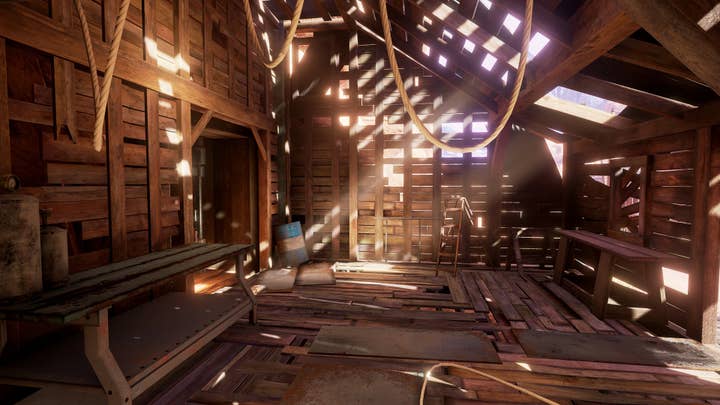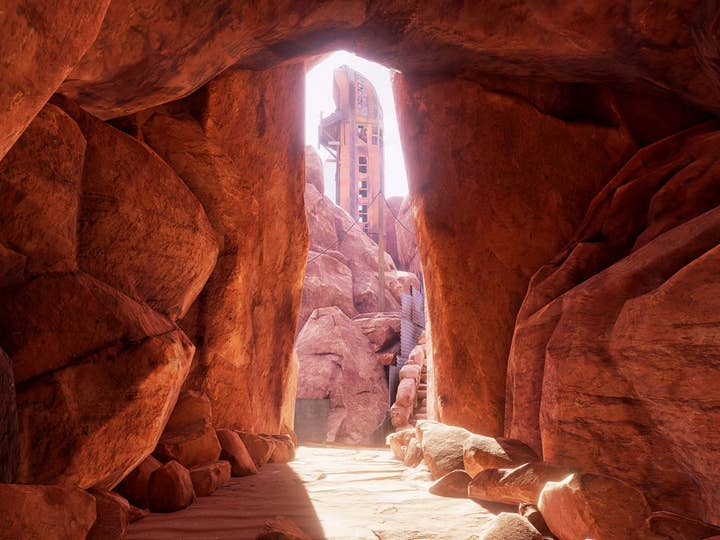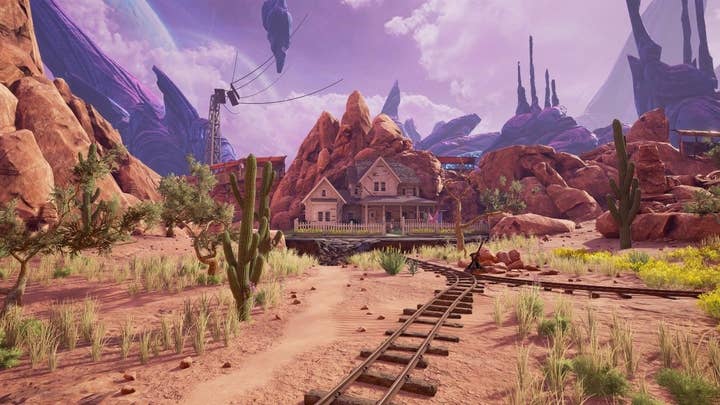"There's no publisher but...there's no publisher"
Rand Miller of Cyan Worlds on the oldest indie problem
Myst was a landmark game. Despite the faux-fashionable shade that's sometimes thrown in the direction of its memory, the Cyan Worlds IP was a massive milestone in the development of gaming and the expansion of its audience. Holding the title for the best-selling PC game for nearly a decade, Myst played a major part in the adoption of CD Rom technology for gaming and spawned an entire genre of copycats. It's been remade three times, spawned a series of books, has a TV series in the works and almost gave rise to a Disney theme park.
As an IP, then, it's a pretty big deal. Now, Myst developer Cyan Worlds has released Obduction a game which abandons the Myst name but very much keeps its aesthetic - and to great effect. For most fans, Obduction is a triumphant celebration of everything which made the original so brilliant: the world building, the subtle story, the tooth-grinding puzzles. But co-founder and lead designer Rand Miller says the game's critical success has yet to translate to sales.
The problem with no publisher
"Oh, it's nerve-wracking," chuckles Miller, laconically. "With any creative endeavour you feel like you pour your heart into something and you're going for a particular direction that you think will be accepted and you think people will appreciate but you never know until it's out there. I can imagine writing is the same thing, you finally get it done and tuned and tied up as best you can with whatever deadlines or money you have and then you put it out into the wild and then you just wait. So yeah, I remember when the first review came in that morning that we released, there was a sigh of relief. It was a fairly high rating and I said 'OK that's all, I just need one, I just need to know that one person appreciated it and I don't care if the rest are bad.' And then of course I changed my opinion because they started coming in good and then I have expectations that are higher at that point so I had to remind myself not to get greedy.

"But...I think the press and the reviews don't translate directly necessarily into sales, and because we're just a little indie shop who doesn't have any marketing - well frankly we didn't keep any of the money for marketing stuff - now we have to figure out what the next stage is. I feel with Obduction, like our other games, it might have some legs, it might be able to last a little longer than a trendy FPS but it's...we've got to figure out how to let people know about it. I just feel like there's not a lot of people that know about it necessarily. So that's the next step. By the way, I'm sure it's not unique to us, you can make an incredible product and [flop] unless people know about it. For an indie it's the problem we have with this wonderful equaliser of selling directly to the public. There's no publisher but...there's no publisher."
Marketing is perhaps the biggest problem facing the majority of developers today, assuming that they've already got a decent game in place, but something which works to Miller's favour is the nature of his audience. Not only are they loyal and under-served with his particular brand of world-building, they're considered, smart, and understanding, traits Miller feels are likely linked to his preferred subject matter.
"I'd take a smaller appreciative niche over a caustic general audience anytime, it's wonderful. There's so much support from the people who know about it and even the shows we've gone to, we went to PAX West last week and it was invigorating. It was also, I mean, exhausting, but so many fans, that appreciation you get just kind of gives you energy from the people who know your work and say I love it and this one kind of gives the same feeling. That's just, yeah, you don't ever want to give that up.
"there's some poops in every group but but generally speaking we really have a very wonderful fan base. Maybe it is the cerebral nature of it. It's a slower pace, it just lends itself to some people who aren't frenetic"
"But, you've caught me off guard, I never really thought about why the community is so supportive and positive. But you're right, as I've said before, there's some poops in every group, but generally speaking we really have a very wonderful fan base. Maybe it is the cerebral nature of it. It's a slower pace, it just lends itself to some people who aren't frenetic and maybe there's not a kneejerk response, they're more patient just by the very nature of the game itself which... I don't know. I don't want to put anybody else down either because I'm sure there's supportive groups in other games as well it just feels like we're especially lucky with who we've got."
The right kind of difficult
The puzzle design at the core of Miller's games is distinctive: physical, environmental, often deceptively simple. Judging the difficulty is clearly absolutely fundamental to enjoyment, but one of the joys of the series is that almost exclusively, Miller's puzzles appeal to universal human rationality - solvable deductively and without recourse to external knowledge. This 'language' of puzzles, and games in general, is a fascinating area, with a remarkably extensive shared lexicon having been established in a short space of time. Most people, for example, know exactly what's happening when they're given a Towers of Hanoi or a 'put out the lights' puzzle, but that also makes them pretty uninteresting, and doesn't lend them to a sense of environmental nativity. Miller says it's a complex balancing process.
"We're so steeped in culture and our own particular culture that it has to be a concerted effort to try to try and make it more broadly appealing and understandable," Miller explains when I ask about assessing the external knowledge necessary to solve puzzles. "I like to think we've done that but since you bring up that question I start to think back on particular elements of our game that aren't necessarily culture.

"We do try to make things iconic so people will understand it. A good example is the - and I don't know whether we hit it with this - but the power puzzle is a good one because you follow the powerline back to what we consider to be kind of the backside of a power distribution area, what we put on the top of that are these weird iconic insulator kind of things that I'm not sure what they really are but they kind of give a general feel of, 'Wow, there's a lot of power here.' But I don't know if it works for a 12 year old in China, to be honest with you. I think it might because I think power distribution is somewhat universal but how much of that is just my American upbringing that I'm used to how it's done here?
"So I think we do try that but we're also probably stymied by just what we know which of course is never truly a really global outlook. Anyway, that's a really good question. I would love to watch some fringe kind of cultures play the game and see what things they completely missed. You don't want to go too fringey because obviously you can't please everyone but it would be a really interesting study to see which things they completely didn't understand at all.
"The power one is interesting because I don't think anyone in the United States even, except for a very small group of people knows that a locomotive engine can be used as a generator. We looked up and they actually have generators built into them to provide power so we had to provide hints like a really thick power cable that couldn't look like a hose, it had to look like it was electrical oriented and then even where it plugs in, we put a 440V sign there. Now 440V it's not a universal or worldwide voltage amount but it's big, it's big enough that you realise 'oh, this is going to make some electricity here.' So those little things hopefully get the clues across."
Another key to successful puzzle game design is the feeling of progress, even when you're still looking at the same problem 45 minutes later. Games like The Witness master the art of gradual education and challenge of the player, but in Obduction the problems are self-contained, different almost every time. There's also often only one thing to bang your head against at any time. With an FPS, the player is able to understand that, next time, they might make the shot, to dodge the grenade, to reach the cover. In the binary world of problem solving Obduction inhabits, that's not an option. How does Cyan Worlds prevent frustration setting in?
"One is we don't make people start over, at least not in the traditional sense of gaming. That can be a real hindrance or a frustration level, you die and you start over and that's where people stop playing"
"It's a good question, I think there's a couple of things that we use to our advantage. One is we don't make people start over, at least not in the traditional sense of gaming. That can be a real hindrance or a frustration level, you die and you start over and that's where people stop playing. 'I'm starting over, I don't have time for this, I'm going to stop playing.' So that is essentially out.
"That's a huge psychological benefit we have then because you always feel like you're making progress even if all that you're doing is, as people have said before, walking back and forth. You at least don't feel like, 'You're putting me all the way back in that entry canyon? OK I don't want to do it…' So we overcome one thing just by the nature of not dying in our games.
"The second things is I think we have, as I mentioned earlier, if we've done our job right we have this thing tugging on the back of your mind. The story becomes your story and the puzzles become your puzzles and they kind of sit there pulling you back into the game so even if at some point you're like 'I've had enough, I gotta get outta here, things aren't clicking,' even if your intent at that point is 'I don't know when I'll come back and play, I've had it with this game' if we've done our job right with the other two - particularly the story element but the environment as well - those things just kind of burn slowly on you and you start to think about things that might… the story intrigues you or you start to think in the environment things you saw and then even the puzzles, 'Oh my gosh, I just thought of something, what if I go do this, I should try that.' I think those are the things we have going for us.
"So I think yes we try to tune those puzzles well and we actually bring in people to play because we want to make sure that they're making the connections but the biggest thing for us is that we build the connections in and then we let it just eat on you hoping that you'll come back and keep trying until you nail it. Then ultimately, and I've said this before, once you do make the connection if you look back and go 'Oh I should have seen that, I should have seen the fact that there were power lines going right to his house, there it is, laid out for me,' then we've done our job right.

"But, and we do this, if you make a puzzle [and the player] says 'Oh those designers are idiots there's no way I could have picked this up,' and of course we've made puzzles like that as well, then we haven't succeeded quite as well as we should have. The goal is to get them all to be the former and not to be the latter. Maybe some day we'll achieve that."
Storytelling without storytellers
Obduction is much more than a series of puzzles, however interesting. There's a solid story running through the game, a story in notes and scraps of background information that must be pieced together to fully understand what has actually happened in the world of Hunrath. Because Cyan's games tend to eschew the easy out of extensive NPC exposition, Miller and his team have to ensure that the narrative is woven closely to both puzzle and environment.
"It's incredibly organic," he says of the process. "The way I've described it is that we have these three legs of the tripod that we design with: the environment, the actual place itself, what it looks like; we have the friction, which is the puzzles, what slows you down, what keeps you from getting everywhere immediately; and the story.
"Those three things, in our particular games we love it when those are balanced well. It doesn't mean a game is always better if they're balanced well. There are other games that weigh heavily on one leg or the other and they do fine because people are entertained in various ways but I think what we really like doing is balancing those three legs well.
"It's interesting to me because the way we design is related to the way I've done worlds since I was fairly young... it's very similar to children drawing treasure maps. I don't think I've ever used that particular analogy but that's just what comes to mind. I remember as a kid you'd want to draw a little map and X marks the spot of course where the pirates hid the treasure but it's a top down architectural mapping of space and it starts with that as a child. I remember playing Dungeons & Dragons when I was a kid.
"I remember doing the same thing where I made a world in D&D and my world didn't require dice rolls and it had puzzles and friction and a castle that I basically took people through, but it was designed the same way"
I didn't particularly play that much, I wasn't enamoured with it completely, but I did want to make a world. I remember doing the same thing where I made a world in D&D and my world didn't require dice rolls and it had puzzles and friction and a castle that I basically took people through, but it was designed the same way. I started drawing a place that people were and it's as if the place revealed itself on a piece of paper the same way it would reveal itself to people who were exploring it, a little piece at a time.
"So it's an incredibly organic feeling and it's also incredibly work intensive. If your game mechanic is a shooter you've got this great simplified - well I don't want to over simplify it - but your mechanic is done. I have a weapon, I shoot a bad guy, I get more stuff, so I can get a better weapon and shoot more bad guys. That's a great achievement-oriented friction. Bad guys and weapons. But it's a known one, it's done, your game plays that way and now all you have to do is wrap a loose environment and storyline in there, but the point is killing the bad guys.
"We don't have that luxury. We can only loosely draw on the puzzles we've done before or people will think, 'They did the same puzzle they did in Myst or the same puzzle they did in Riven.' We have to try and give people some fresh puzzles along with the environments that feel like the puzzles belong and the story that's revealed when you get there. It's incredibly difficult to do and may be why not a lot of people do this kind of thing."

